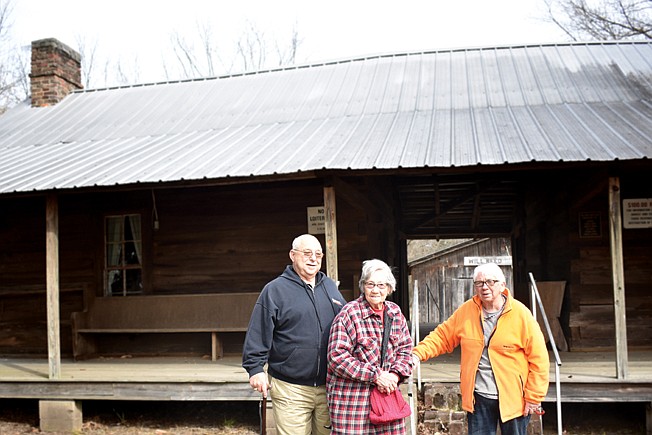By Jim Williamson
Texarkana Gazette
A dogtrot house, known as the Will Reed Farm Cabin, was hand built 124 years ago in Little River County, Ark, near Alleene, Ark.
The Alleene house was on the western frontier of the Indian territory, said Gary Tong, who serves as a curator.
The dogtrot house was built in 1895 by J.D Abney. Tong defined a "dogtrot" as two log cabins connected by a breezeway, or dogtrot.
"They were living on the frontier and were decent God-fearing people. They were the spirit of the town," he said of these settlers who migrated to Southwest Arkansas.
Building a house to protect the family from the elements was a common-sense strategy for the safety and survival of the family, Tong said.
The settlers cooked and dined in one cabin, while the other was used as a living space, such as a bedroom.
The cabin was also the location of the Will Reed Blacksmith Shop. It had which had a sign advertising coffin building.
The builders constructed the cabin out of hand-hewn logs put together with wooden pegs and covered with handmade cypress shakes.
In 1902 the house was purchased by Will Reed, who lived there for 50 years.
The Little River County Historical Society now owns the house and operates it as a historical museum. The house was listed on the National Register of Historic Places in 1978.
The Will Reed Museum in Alleene is one of five museums in Little River County. The other museums are Foreman's New Rocky Comfort Museum, Two Rivers Museum, Winthrop School House Museum and the Hunter-Coulter House in Ashdown.
The museum provides evidence of how people lived before the turn of the century.
"After the Civil War, people were moving west. They were poor people and not slave owners," said Tong, who serves as a curator for the log cabin.
Tong is a native of Alleene and has a graduate degree from UTA with a public history specialty in archival administration.
Volunteer Vivian Keeney helps Tong educate people about the museum and the style of living.
"It shows how hard the ancestors worked to survive. They plowed fields and had gardens. They fished and hunted for coons, squirrel and deer," Keeney said.
"They ate everything but the squeal. They worked hard to survive. All kinds of fevers were raging."
"The ancestors were poor as church mice, but rich in culture," Tong said.
Volunteers have taken care of the cabin and continue to discover the style of life in the late 1800s and early 1900s.
The volunteers include Tong, Keeney, Robbie Jones, Mildred Kanakis, Verna Roberson and Bill Duckett. Dixie Tong was a volunteer, but she died Feb. 3.


